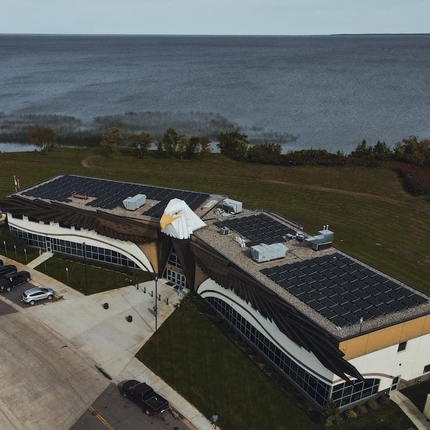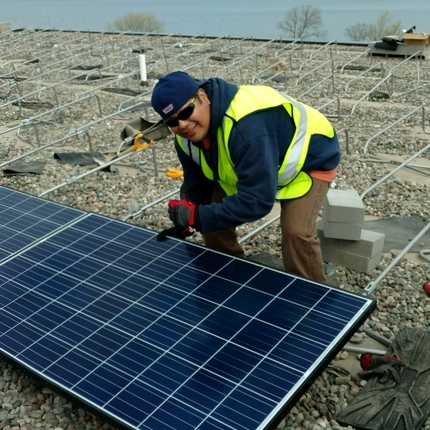Robert Blake clearly has a passion for solar energy. A Tribal citizen of the Red Lake Nation, Robert's enthusiasm is fueled by what he sees as an immense opportunity for Native communities to reap both the economic and environmental benefits of clean energy production, as well as provide leadership in the clean energy transition.
As the owner of Solar Bear, an installation company, Robert has been overseeing the development of solar projects across Minnesota, including the construction of the first two Tribal developments in Red Lake. He also serves as the executive director of Native Sun Community Power Development, a nonprofit focusing on Native civic engagement, solar workforce development, and youth environmental programming that preserves Ojibwe language and tradition.
“Being able to generate and distribute your own energy is the cheapest form of energy,” Robert said. “When you think about the cost savings and jobs created, it makes sense to build solar. Tribes can create their own energy and hire their own people. It’s economic development.”
The Red Lake Nation is one of the Tribes leading the way in this effort. In early 2022, they won federal approval to become the first-ever Tribal Energy Development Organization (TEDO), or Tribal energy utility. This designation will allow the Tribe more autonomy and freedom to develop clean energy projects, including negotiating leases and energy agreements. It will also allow them to sell the energy they generate on the electrical grid. With the TEDO in place, Robert said there are now 200 to 400 megawatts of utility-scale solar development planned at the Red Lake Indian Reservation, which has a population of 5,500.
“Having the ability to generate energy is security,” Robert said. “With more severe weather events and security threats posed by hackers, more distributed energy resources are needed across the country to ensure that the energy grid is resilient.”
While creating Tribal utilities such as TEDO’s is one step in ensuring energy development is fair and equitable, Robert said there is also a need for more coordination. Because energy projects, such as transmission lines, often run through Tribal country, cooperation and communication between Tribes and state governments is essential.
Robert points to Minnesota House File 1647, a bill to require Minnesota’s Department of Commerce to assist Tribal advocacy councils on energy, as a road map for other states.
“While Tribal governments operate autonomously from the state, it’s important that state departments are consulting with Tribal nations,” he said. “We need Tribal energy advisory boards who can work with the state. Then one day we can create Tribal utility commissions. It’s a more ethical way to do business.”
Another important policy development, Robert points out, is the Tribal energy grant and loan guarantee program funding included in the Inflation Reduction Act (IRA).
“This gives Tribes the ability to secure capital for renewable energy projects, something that has previously been hard to do,” Robert said. “This new program increases loan guarantees from $2 billion to $20 billion. I can see a lot of interest in taking advantage of this.”
Looking ahead, Robert is optimistic about the future of clean energy and the opportunities that will be presented.
“It’s exciting to have access to this technology today when we haven’t before,” he said. “When Tribes are able to generate and distribute their own energy they are saving money and can put that money back into their communities. It’s good for the community and for the planet.”
Feature photos (top): Red Lake Government Center, a 78 KW system; (bottom) Robert Blake works on one of the panels.






